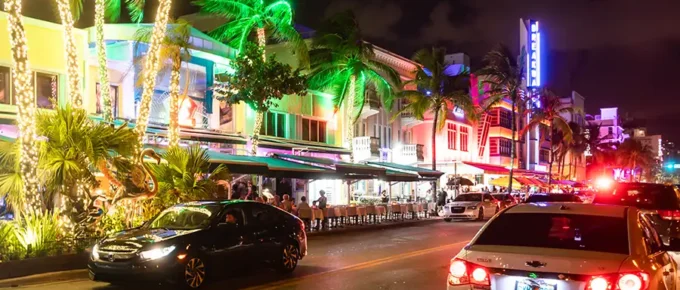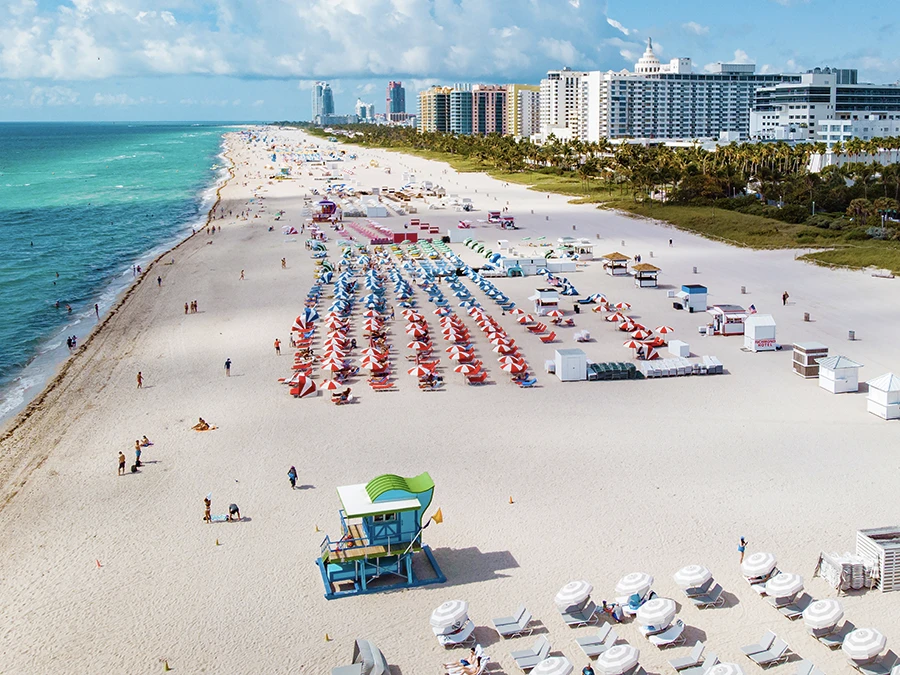
Understand your right to compensation if you were injured as a guest at a Miami restaurant.
Miami’s culinary scene is as vibrant and diverse as the city itself, offering an eclectic mix of flavors and experiences that cater to every palate. From the sumptuous Cuban cuisine at Versailles, famous for its authentic flavors and bustling atmosphere, to the innovative dishes at Joe’s Stone Crab, a staple for seafood lovers, Miami’s restaurants are a gastronomic delight.
However, amidst this lively food scene, accidents can occur, sometimes leading to injuries among restaurant guests. Whether it’s a slip-and-fall accident due to a wet floor, food poisoning from improperly handled ingredients, or an injury from broken furniture, these incidents can lead to restaurant negligence lawsuits.
Understanding the legal aspects surrounding premises liability after a restaurant accident is crucial, as guests who suffer injuries due to negligence may be entitled to compensation. This article delves into the specifics of restaurant liability in Miami, offering insights into how those affected can seek justice and reparation for their injuries.
If, after reading this article, you still have questions or would like help filing a lawsuit against a restaurant, reach out to experienced Miami injury attorney Mike Redondo at Redondo Law for a free consultation.
Did you know?
According to the Miami New Times, in 2017, Miami had approximately 61 restaurants per 100,000 people—the most restaurants per capita in the entire U.S.
Common causes of guest injuries at Florida restaurants
Guests at restaurants can unfortunately face a variety of risks leading to injury, some of which include:
- Slip-and-fall accidents. These are among the most common incidents in restaurants. Spilled liquids, food debris or recently mopped floors without proper warning signs can create slippery conditions that lead to accidents and injuries like broken bones, traumatic brain injuries and spinal cord injuries.
- Scald burns. Hot foods and beverages or accidents in self-serve areas where guests handle hot items can lead to scalding.
- Food poisoning. Improper food handling, storage or cooking can result in foodborne illnesses. Contaminated food can cause serious health issues, ranging from mild stomach upsets to severe infections like meningitis. In some cases, pregnant women who ingest food contaminated with Listeria may experience complications such as miscarriage, premature delivery or severe infection in their newborn.
- Choking. This can occur if the food is not properly prepared or in cases where there’s an inadequate response from the restaurant staff to a choking emergency.
- Cuts from broken glass or utensils. Accidentally shattered glassware or malfunctioning utensils can cause cuts or other injuries.
- Injuries from faulty furniture. Collapsing chairs or tables due to poor maintenance can lead to falls and associated injuries.
- Allergic reactions. Without proper menu labeling or staff knowledge about ingredients, guests with allergies may unknowingly consume harmful allergens.
- Violence from other guests. Incidents like fights or aggressive behavior, especially involving intoxicated guests, can pose a risk to others.
In cases where these injuries are due to the negligence of the restaurant, such as inadequate safety measures or failure to maintain a safe environment, the injured party may have grounds for a personal injury lawsuit.
Who is responsible for preventing accidents in a restaurant?
The ultimate responsibility for preventing accidents in a restaurant falls on the owner. It’s the owner’s duty to ensure that the establishment adheres to all health and safety regulations and maintains a safe environment for both patrons and staff.
This responsibility encompasses several key areas:
- Establishing safety protocols. The owner must establish and enforce comprehensive safety protocols covering everything from food handling and storage to the maintenance of the premises.
- Providing training for staff. Ensuring that all staff members receive regular training on safety practices, emergency procedures, and proper food handling is crucial. The owner must facilitate and oversee this training.
- Having regular inspections. The owner is responsible for ensuring that the restaurant undergoes regular maintenance and safety inspections. This includes fixing any hazards like broken furniture, ensuring proper lighting, and keeping floors clean and free from slip hazards.
- Complying with health and safety laws. Adhering to all relevant local and federal health and safety regulations is a legal requirement. The owner must stay informed about these regulations and implement any necessary changes to remain compliant.
- Hiring competent management and staff. The owner should hire capable management and staff who understand and can effectively implement safety protocols.
- Monitoring food safety. The owner must ensure that the kitchen staff adheres to food safety guidelines to prevent foodborne illnesses.
- Handling intoxicated guests. Particularly in restaurants that serve alcohol, the owner must ensure procedures are in place for dealing with intoxicated guests responsibly, including refusing service to guests who are known habitual drinkers.
While the day-to-day responsibilities may be delegated to management and staff, the owner carries the overall responsibility for ensuring that these measures are effectively implemented and followed. Failure to do so can result in accidents, legal liability, and damage to the restaurant’s reputation.
Can I sue a restaurant owner if I’m injured by a drunk guest?
In Florida, the ability to sue a restaurant owner if you’re injured by a drunk guest is influenced by the state’s dram shop law, as outlined in Florida Statute 768.125. According to this law, a person or establishment that sells or supplies alcoholic beverages to someone who is legally old enough to drink is generally not liable for injuries or damages caused by that person’s intoxication.
However, there are exceptions: If the restaurant owner willfully and unlawfully sells or provides alcohol to someone who is underage or who is of legal drinking age but known to be habitually addicted to alcohol, that owner may be held liable for injuries or damages resulting from that person’s intoxication.
Given these conditions, a restaurant owner could potentially be liable for gross negligence if they served alcohol to a minor or someone with a known addiction who violently injured another person in the restaurant. However, it would need to be established that serving alcohol to that individual directly caused the violent act that led to the injuries.
The reality is that these cases are often complex and can be difficult to prove. Establishing the restaurant’s knowledge of a guest’s age or history of addiction and linking it directly to your injury requires a detailed legal approach, so it’s crucial to consult an attorney with experience in handling such cases to fully understand your legal options.
How do you prove negligence in a restaurant injury claim?
Proving negligence in a restaurant injury claim involves establishing several key elements:
- First, you must demonstrate that the restaurant owed you a duty of care. This is typically straightforward, as restaurants have a legal obligation to provide a safe environment for their customers.
- Next, you need to show that the restaurant breached this duty. This could involve proving that the restaurant failed to maintain safe premises (like wet floors without warning signs, broken furniture, unsafe food practices, etc.), which is a deviation from what a reasonably prudent restaurant would do under similar circumstances.
- Then, you must prove that the restaurant’s breach of duty directly caused your injury. For instance, if you slipped on a wet floor without a warning sign and broke your leg, you need to establish a clear link between the lack of a warning sign (breach of duty) and your injury (the broken leg).
- Finally, you must prove that you suffered actual damages due to the injury. This can include medical bills, lost wages, pain and suffering, and other related expenses.
To effectively prove these elements, evidence such as accident reports, witness statements, medical records and expert testimonies can be crucial. Photos or videos of the hazard that caused the injury can also be powerful evidence.
An experienced personal injury attorney can be invaluable in gathering and presenting this evidence to build a strong case for negligence.
A guide to miami tourist accident lawsuits & compensation
Understand your rights and how to recover maximum compensation after an accident while visiting Miami.
How does Florida’s new 2023 negligence law affect compensation in personal injury cases?
As of March 2023, Florida uses a legal principle called modified comparative negligence to determine fault in personal injury claims.
Under Florida Statute 768.81, each person in a personal injury lawsuit is assigned a percentage of fault for an accident, and compensation for the plaintiff (injured party) is reduced according to their share of fault. Additionally, if the plaintiff is found to be more than 50% responsible for their injuries, they can’t recover any compensation.
Here’s an example of how Florida’s modified comparative negligence law could impact a restaurant injury claim:
Suppose you slip and fall at a restaurant due to a spilled drink that wasn’t cleaned up or marked with a warning sign. During the trial, evidence shows that the restaurant staff neglected to clean the spill in a timely manner, but it also reveals that you were texting and not paying full attention to where you were walking at the time of the accident.
If the court assigns 60% fault to the restaurant for failing to address the spill and 40% fault to you for not paying attention, your final compensation will be reduced by your percentage of fault, which in this case is 40%. So, if your total compensation would have amounted to $100,000, under Florida’s modified comparative negligence law, your compensation would be reduced to $60,000.
However, if the roles were reversed and you were found to be 60% at fault while the restaurant was deemed 40% at fault, you would be unable to recover any compensation due to being more than 50% responsible for the accident.
Because the determination of fault plays such a crucial role in the compensation you can receive, it’s highly recommended that you consult an experienced personal injury attorney as soon as possible after a restaurant accident to minimize your liability and ensure your rights are protected.
How long do I have to file a claim against a restaurant in Florida after an injury?
As of March 2023, you generally have 2 years from the date of the injury to file a claim against a restaurant in Florida.
It’s crucial to adhere to this 2-year statute of limitations because if you attempt to file a lawsuit after this time has elapsed, your claim is likely to be dismissed, and you will be unable to seek legal compensation for your injury.
Injured at a Florida restaurant? Get help from an experienced Miami injury attorney.
If you’ve suffered an injury at a restaurant in Florida, get the legal help you need from Miami injury attorney Mike Redondo at Redondo Law. Navigating claims against restaurants can be daunting, especially large chain restaurants with legal teams dedicated to minimizing their claims.
After years spent working for insurance companies during his early career, Mike’s unique expertise can help you level the playing field. He knows how to counteract the strategies of insurance companies and corporate attorneys, ensuring your rights are protected and you receive the compensation you deserve.
Contact Redondo Law today using the form below for a free consultation, and take the first step toward securing justice for your injury.
References
Statutes & Constitution :View Statutes : Online Sunshine. (n.d.). Www.leg.state.fl.us. http://www.leg.state.fl.us/Statutes/index.cfm?App_mode=Display_Statute&URL=0700-0799/0768/Sections/0768.125.html
Statutes & Constitution :View Statutes : Online Sunshine. (n.d.). Www.leg.state.fl.us. http://www.leg.state.fl.us/statutes/index.cfm?App_mode=Display_Statute&URL=0700-0799/0768/Sections/0768.81.html


